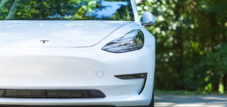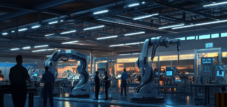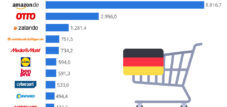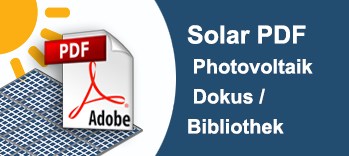Revival of the e-car bonus in Germany | The e-car bonus is back: Why used car buyers now also benefit
Xpert pre-release
Language selection 📢
Published on: October 12, 2025 / Updated on: October 12, 2025 – Author: Konrad Wolfenstein

Revival of the e-car bonus in Germany | The e-car bonus is back: Why used car buyers now also benefit – Image: Xpert.Digital
Electric cars finally for everyone? New incentive targets low- and average-income earners
After Habeck's stop, 3 billion package approved: This is why the government is relaunching e-car subsidies
After its abrupt end last year, it's now official: The e-car incentive in Germany is making a comeback. With a budget of three billion euros, the new federal government aims to give new impetus to electromobility and is introducing a key innovation: for the first time, used electric vehicles are also becoming the focus of the incentive. The measure specifically targets "low and medium incomes" in order to make the switch to a zero-emission vehicle affordable even for citizens with limited financial means. After the incentive was discontinued at the end of 2023 for budgetary reasons, its reintroduction marks a change of course in economic and climate policy. The new incentive is therefore more than just a financial incentive – it is a strategic attempt to make the transport transition in Germany broader, more socially inclusive, and more sustainable.
Introduction: What is the new e-car bonus all about?
What is the e-car bonus and why does it play an important political role?
The e-car bonus is a government subsidy designed to encourage the purchase of electric vehicles. Its goal is to promote electromobility in society and contribute to climate protection by encouraging more citizens to switch from combustion engines to electric vehicles. This bonus has gained political significance, particularly because it has become a symbol of the transport transition and environmentally friendly funding policies, and is thus closely linked to the public's perception of progress and willingness to innovate.
Why was the e-car bonus originally discontinued and why is it now being revived?
The e-car bonus was discontinued at the end of 2023 by then-Economics Minister Robert Habeck (Alliance 90/The Greens), primarily for budgetary reasons. The traffic light coalition was forced to make savings, and the subsidy fell victim to budget cuts. As part of a shift in economic and climate policy, the current coalition government decided to reintroduce the bonus to boost electric mobility and, above all, support "low and middle incomes" in the transition. A budget of three billion euros was allocated for this purpose.
Who benefits from the new e-car bonus?
Who is at the center of the funding and which target groups are addressed?
The new e-car incentive primarily focuses on so-called "low and middle incomes." The government aims to encourage citizens and families with limited financial means to switch to battery-powered vehicles. This includes households that previously could not afford an electric car due to high purchase costs, as well as all those who rely on their vehicle for purposes such as commuting to work or family obligations.
What distinguishes the target groups of the new premium from those of previous funding programs?
Previous subsidy measures were often aimed at all new car buyers, regardless of income bracket. The new regulation places a socio-political emphasis on how the subsidy can reach "low and middle incomes," for example, through income limits, staggered subsidy amounts, and exceptions for certain occupational groups or regions particularly affected by the mobility transition.
How does the new funding system work?
Which vehicles are eligible for funding and what is new about the funding for used electric cars?
The key difference from the previous subsidy is that used electric vehicles are now also included in the premium. This is intended to stimulate the used car market and make electric mobility more widely available by supporting people with lower budgets who want to purchase a used – often cheaper – electric car. Eligible for the subsidy are new and certain used electric vehicles that must meet specified minimum requirements (such as remaining range, battery condition, and age limit).
How much is the funding, how do I apply, and what are the conditions?
The exact amount of the subsidy is still being determined, although it's possible that it will be scaled based on vehicle type, first registration, and condition. Applications are generally submitted digitally via the Federal Office for Economic Affairs and Export Control (BAFA) or a dedicated platform. Buyers must provide certain documentation—for example, regarding income, vehicle age, and technical specifications. Depending on the model and income, the subsidy can amount to several thousand euros.
What effect does the bonus have on the used car market?
Why is the expansion to used vehicles relevant for the mobility transition?
A critical sticking point for electric mobility in Germany so far has been that progress has been primarily seen in the new car market, while a new car remains unaffordable for many segments of the population, despite incentives. Used electric cars are cheaper to purchase and can therefore reach a broader range of buyers. The subsidy will stimulate their sales and promote the penetration of e-mobility into all segments of the population.
How does the bonus change the price and supply landscape of used electric cars?
From an economic perspective, demand for used electric cars is likely to increase significantly. This could lead to rising prices in the medium term, but also stimulate supply: Due to more returns from leasing contracts or fleets switching to new models, many vehicles will enter the market. Dealers will strive to increase quality and transparency – for example, through battery condition certificates – and thus strengthen the specialist trade.
What are the political backgrounds and points of contention?
How is the reintroduction of the bonus viewed by the political camps?
There is consensus within the government that the incentive is a necessary signal for innovation and climate policy. The opposition is partly critical: skeptics criticize the budget burden of three billion euros, question the ecological footprint of electric cars, and fear distortions of competition. Particularly controversial is the question of whether the incentive is truly socially just and does not once again primarily favor higher-income city dwellers.
What economic policy goals does the government pursue with this measure?
The government is pursuing several goals with the premium: First, to increase demand for electric vehicles in order to strengthen the electromobility sector. Second, it aims to counteract the pressure for innovation from abroad, as China, for example, is flooding the European market with affordable electric cars. Third, the premium serves as compensation for rising energy and raw material costs, which are particularly affecting private households.
Challenges and risks of the new funding
How sustainable is the funding and how can abuse be avoided?
A key challenge is to ensure that the subsidy is designed appropriately and transparently. The government aims to prevent abuse by monitoring criteria such as income, vehicle age, and minimum technical standards. Experts point out that subsidy programs in the past have sometimes been plagued by free-rider effects and deliberate manipulation by dealers and private individuals. Modern monitoring tools and digital application processes are intended to remedy this.
Is there a risk of perverse incentives or negative side effects?
Indeed, there is a risk that market mechanisms could be distorted. For example, dealers could raise prices for eligible vehicles, or buyers could be guided solely by subsidy criteria rather than actual needs. The environmental impact is also ambivalent: An excessive focus on pure battery-powered vehicles could displace other alternative drive systems and create new raw material weaknesses.
New: Patent from the USA – Install solar parks up to 30% cheaper and 40% faster and easier – with explanatory videos!

New: Patent from the USA – Install solar parks up to 30% cheaper and 40% faster and easier – with explanatory videos! - Image: Xpert.Digital
At the heart of this technological advancement is the deliberate departure from conventional clamp fastening, which has been the standard for decades. The new, more time- and cost-effective mounting system addresses this with a fundamentally different, more intelligent concept. Instead of clamping the modules at specific points, they are inserted into a continuous, specially shaped support rail and held securely. This design ensures that all forces occurring—be they static loads from snow or dynamic loads from wind—are evenly distributed across the entire length of the module frame.
More about it here:
Segen and risk: How the bonus is shaking up the auto industry
Impacts on society and climate protection
What does the bonus mean for social mobility in Germany?
The newly designed premium has the potential to narrow the gap in vehicle mobility. Those who previously lacked access to modern e-mobility due to financial constraints can now benefit from affordable used electric vehicles. This is particularly relevant for rural areas, where public transport is often weaker and residents rely on their own cars.
Can the premium actually contribute to climate protection?
The answer is nuanced: In principle, electric cars enable a reduction in CO₂ emissions from private transport, provided they are powered by green energy. Critics, however, point out that the entire environmental impact – from raw material extraction to disposal – is problematic and that a sustainable circular economy is currently lacking. Nevertheless, the subsidy is a building block on the path to a lower-emission society.
Technological development and market trends
Which types of electric cars are eligible for funding and how is the offering developing?
The subsidies primarily apply to battery-electric vehicles that meet certain minimum requirements for range and efficiency. The market varies by segment (small cars, compact class, luxury models, commercial vehicles) and price range. The urban small car and compact family car segments are particularly dynamic, but delivery services and tradespeople also benefit from the subsidies.
What role do charging infrastructure and fleet conversion play?
A crucial factor is the charging infrastructure: Only with the widespread availability of charging stations will electric mobility become practical for broad sections of the population. In parallel with the incentive, the government plans further investments in the public charging network, as well as in subsidy programs for private wallboxes. Examples from companies show that the incentive makes fleet conversions more economically attractive and generates greater market impact.
International perspectives and competitive pressure
What is the situation in European and international comparison?
In international comparison, Germany remains cautious: While countries like France, Norway, and the Netherlands have already introduced extensive subsidy programs, including for used electric vehicles, the new German incentive marks a lagging need. At the same time, competitive pressure is growing from foreign manufacturers, especially from China, whose affordable electric cars increasingly dominate the market.
Can German industry benefit from the premium?
For the German automotive industry, the subsidy is both Segen and a challenge. On the one hand, it increases demand for electric vehicles, promotes sales, and strengthens industry development. On the other hand, it increases the pressure to innovate, as domestic manufacturers have to compete with foreign competitors in terms of technology and price. Suppliers and medium-sized companies can tap into new business areas, for example, in battery recycling.
Sociopolitical and regional dimensions
What does the premium mean for structurally weak regions and mobility in rural areas?
In structurally weak regions, the premium could provide an impetus for the expansion of electric mobility, especially where commuting and everyday mobility are often only possible by car. Targeted programs could offer particularly attractive funding conditions in these areas. Municipalities and local businesses would also benefit, for example, through the modernization of municipal vehicle fleets.
How will social acceptance and dynamics surrounding e-mobility change?
The incentive sends a societal message: electric mobility is no longer a luxury or prestige item, but should become an everyday standard. Social acceptance will increase, especially when used vehicles become accessible to broader sections of the population. Employment in the relevant sectors could rise, and the willingness to innovate will grow thanks to a broader market and more user feedback.
Critical voices and future perspectives
What criticisms are still being discussed and what alternatives are there?
The main points of criticism include the economic burden on the state budget, potential windfall profits, and the incomplete environmental impact of battery production. Alternatives are being discussed, such as greater support for hydrogen vehicles or synthetic fuels in private and public transport. Tax incentives and bonus-based leasing models are also in the spotlight.
What development prospects are conceivable for the e-car bonus?
In the medium term, funding could be structured dynamically, for example, through regular adjustments of funding amounts, the integration of additional vehicle types (e.g., plug-in hybrids with stricter criteria), or linking with other funding measures in the field of renewable energies. Experts point out that funding programs only have a sustainable impact if they are part of a holistic mobility concept.
Outlook on the mobility transition in Germany
How does the new bonus change the overall picture of the mobility transition?
The reintroduction of the e-car subsidy, particularly its expansion to used vehicles, will be a key driver of Germany's mobility transition. It combines socio-political, economic, and ecological incentives and, for the first time, addresses broader sections of the population. The new design thus signals a shift in subsidy policy: away from selective support for wealthy buyers and toward mass-market support that equally stimulates social mobility and innovation.
What remains open for the future?
It remains to be seen to what extent the new funding measures will actually lead to a sustainable market transformation. What is crucial is that accompanying measures such as the expansion of charging infrastructure, innovations in vehicle technology, and the development of a circular economy for batteries also progress. The social momentum surrounding electromobility is likely to gain further momentum – not least if the new e-car bonus facilitates market access for millions of people.
What questions are there for the coming years?
Several questions will be in focus for the coming years: How will demand and supply for used electric vehicles develop? Can Germany assert its innovative strength against international competition? Will a socially just expansion of the mobility transition, reaching all regions and population groups, succeed? And how can policymakers and industry ensure a responsible and future-proof design of electromobility?
The revival of the e-car incentive in Germany marks a turning point in the political and social transformation surrounding the transport transition. With a budget of three billion euros and a clear target group focused on "low and middle incomes," the funding instrument is being further developed from a socio-political perspective and specifically tailored for a broader impact. Future developments depend on the ability to intelligently integrate the various challenges posed by the market, infrastructure, politics, and ecology and establish electromobility as the new norm for the automotive future.
Look, this little detail saves up to 40% installation time and costs up to 30% less. It's from the USA and patented.

NEW: ready -to -mount solar systems! This patented innovation accelerates your solar construction massively
The heart of ModuRack 's innovation is its departure from conventional clamp fastening. Instead of clamps, the modules are inserted and held in place by a continuous support rail.
More about it here:
Your partner for business development in the field of photovoltaics and construction
From industrial roof PV to solar parks to larger solar parking spaces
☑️ Our business language is English or German
☑️ NEW: Correspondence in your national language!
I would be happy to serve you and my team as a personal advisor.
You can contact me by filling out the contact form or simply call me on +49 89 89 674 804 (Munich) . My email address is: wolfenstein ∂ xpert.digital
I'm looking forward to our joint project.
























